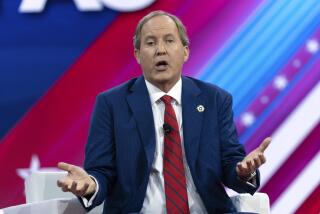Spouses, but not on U.S. soil
- Share via
Americans often tout the great freedoms that U.S. citizenship grants. But lately I have a hard time seeing it that way. Instead, I find myself toying with renouncing my citizenship. When it comes to my ability to spend my life with the person I love, this country has turned its back on me.
I am a dual national. I was born in the United States to an American mother and a Spanish father. I grew up in Spain, although my family frequently jetted across the ocean to maintain bonds with family and friends. Thirteen years ago, I returned to the U.S. to work in New York for the United Nations.
On July 14, 2006, I married the person I love in a small ceremony with close friends and family. I could do so because, in 2005, Spain’s parliament legalized same-sex unions. Without too much fanfare and with surprisingly little outcry from the vociferous Roman Catholic Church, Spain — traditionally a Catholic nation — took a brave step to recognize the rights of all citizens to a family life. The ground did not shake; society’s fabric did not tear. Jose and I were married by the mayor of a small town outside Seville in the first same-sex marriage ever held in the community. People there expressed nothing but happiness for us.
I had naively assumed that our union would allow us to live together. The United Nations, where I am considered a Spaniard, had approved an administrative decision recognizing the marriages that the national jurisdictions of its staff members consider legal. In other words, because Spain recognized our marriage, the U.N. would too, by virtue of Spain being my country of provenance.
Upon returning to the United States, however, I discovered that things were more complicated.
Ordinarily, in a case like mine, the United Nations would have requested visas for me and my spouse. The United States, in keeping with its role as host country of the U.N. headquarters, would have issued them. My spouse would have been permitted to reside legally on U.S. soil. But because I am an American citizen in addition to being Spanish, the United Nations doesn’t have a reason to request a visa for me. While my employer considers me Spanish, the U.S. authorities consider me a U.S. citizen.
Most Americans who marry foreigners can initiate a process to obtain a permanent residence status for their spouses. But because of the obscenely titled Defense of Marriage Act, which President Clinton signed into law in 1996, my spouse can’t qualify for papers through me. The law prohibits the federal government from recognizing any marriage that is not between a man and a woman. And although a federal judge in Boston ruled parts of the law unconstitutional this year, it is likely to be years before the question of its legality is finally resolved. In the meantime, we remain in limbo.
For four years, we have spent thousands of dollars on tuition for courses that would keep my spouse eligible for student visas and able to live in the United States legally. We have endured countless problems and frustrations in our relationship due to the uncertainty about our future. We live with the fear that an immigration officer at the airport will simply refuse to let my spouse enter the country.
We also have had to be circumspect about our union. In the United States, entry can be denied to a person who is expected to remain in the country beyond the term of his or her approved authorization to stay. Marriage to someone, even if not recognized, can nonetheless be considered evidence of intent to stay beyond the period of an approved visa, and hence a reason for an immigration officer to deny entry.
This all leaves me in a quandary: Must I renounce my U.S. citizenship so that I can live in the country of my birth with the person I love?
I hold out hope for legislative change that will remedy this situation, but it has been years already and I don’t feel that I can wait much longer. I want to live my relationship fully, but with every day that passes, I get the sense that doing so may be incompatible with my remaining a U.S. citizen or staying in the country.
Andres Salazar is an international civil servant of the United Nations. The views expressed are personal and do not necessarily reflect the views of the United Nations.
More to Read
Sign up for Essential California
The most important California stories and recommendations in your inbox every morning.
You may occasionally receive promotional content from the Los Angeles Times.













